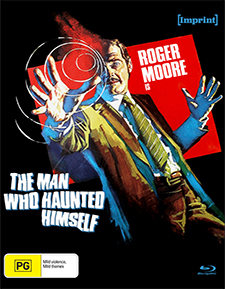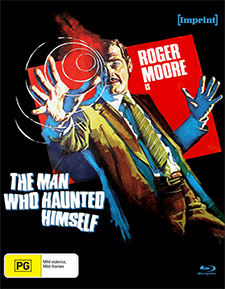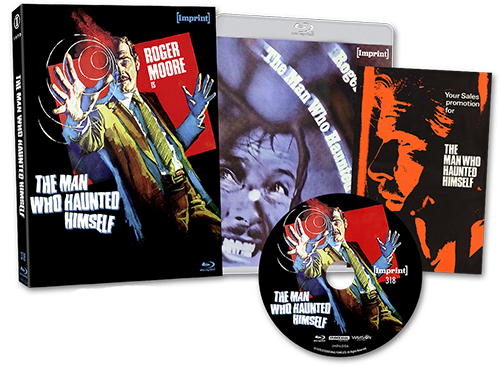Man Who Haunted Himself, The (Blu-ray Review)

Director
Basil DeardenRelease Date(s)
1970 (June 12, 2024)Studio(s)
EMI Films/ABPC/Excalibur Films (Imprint Films/Via Vision Entertainment)- Film/Program Grade: A-
- Video Grade: B+
- Audio Grade: B
- Extras Grade: A
Review
[Editor’s Note: This is a Region-Free Australian Blu-ray import. The film review portion is written by Dennis Seuling, while the disc review portion is written by Tim Salmons.]
The Man Who Haunted Himself (1970), based on the short story The Strange Case of Mr. Pelham by Anthony Armstrong, stars Roger Moore (The Spy Who Loved Me, Moonraker) as Harold Pelham, a conservative executive with a frustrated wife (Hildegarde Neil), two young children, and a bland suburban life. After he recovers from a serious car accident, Pelham’s life becomes unsettling as coworkers, friends, and family start referring to actions, behaviors, and comments of his that he absolutely can’t recall. It soon becomes clear that another version of himself is out there—more caustic, riskier, sexier—who seems determined to throw his carefully constructed world into utter chaos. What remains unclear for most of the film is whether there’s a real, physical doppelganger, or if it’s a figment of Pelham’s imagination.
With a fascinating script by director Basil Dearden (Dead of Night) and Michael Relph (The Assassination Bureau), The Man Who Haunted Himself is a psychological thriller owing much to both Alfred Hitchcock and The Twilight Zone. An average man finds himself in an escalating series of bizarre events and tries desperately to figure out what’s happening to him. It may even be classified as a horror film in that Pelham is faced with an alternate version of himself who seems to be taking over his own life.
If you’re only familiar with Roger Moore from his tenure as James Bond in seven 007 films, you’ll be surprised to see what a textured performance he turns in as not only Pelham, but his own doppelganger. On screen for most of the film, he easily dominates the production, convincing us of Pelham’s confusion, concern, and eventual terror.
Supporting cast performances are uniformly good, with the exception of Freddie Jones as the psychiatrist who seems to have wandered in from a Monty Python comedy sketch. Jones plays the role too broadly, with distracting mannerisms that undercut his credibility as a man of science.
The Man Who Haunted Himself was Basil Dearden’s final film in a career going back to 1939. Dearden builds the story gradually, starting off traditionally with Pelham routinely entering his car after work and heading home. But once on the highway, something compels him to gun the engine and race madly through traffic. What prompts him to be so reckless and wind up horribly injured in an awful accident? Setting up suspense and drawing us in as things turn increasingly weird, the film may hang on a strange occurrence in the operating room after the accident that creates more questions. This is the kind of thriller that forgoes graphic violence and gore in favor of creating mood and producing chills.
A TV adaptation of the same story by Armstrong appeared on Alfred Hitchcock Presents in 1955 starring Tom Ewell as Mr. Pelham. Treated as a dark comedy rather than serious thriller, it was one of only a handful of the series’ installments personally directed by Hitchcock, who was subsequently nominated for an Emmy for that episode.
The Man Who Haunted Himself was shot by cinematographer Tony Spratling on 35 mm film with spherical lenses, finished photochemically, and presented in the aspect ratio of 1.75:1. Imprint Films brings the film to Blu-ray once again with what appears to be the same HD master used by Kino Lorber Studio Classics and Network for their Blu-ray releases. It shows its age with less refined levels of grain, but it’s a very handsome and organic presentation, with bitrates sitting primarily between 30 and 45Mbps, spiking well above that. Mild scratches and speckling can be seen along the way, but nothing appears overly intrusive. The color palette offers a nice variety of hues, well-saturated with lovely flesh tones. Excellent contrast produces deep blacks, allowing for plenty of detail in shadowy environments. It’s also a stable presentation throughout. It may not be as crisp as some modern transfers, but it holds up well enough to be enjoyable.
Audio is included in English 2.0 mono LPCM with optional subtitles in English SDH. It’s a tad flat but still manages to offer good support for dialogue and score. Sound effects don’t have much push, but the track is mostly clean, lacking any obvious hiss, thumps, dropouts, or crackle.
The Man Who Haunted Himself on Region-Free Blu-ray from Imprint Films and Via Vision Entertainment sits in a clear Amaray case alongside a 16-page insert booklet that re-creates the film’s original pressbook. The insert features artwork from the original UK quad theatrical poster on the front and a still from the film on the reverse, while the slipcase features artwork from the original Italian theatrical poster. Bonus materials include the following:
- Isolated Score Audio Track in 2.0 Stereo LPCM
- Audio Commentary with Roger Moore and Bryan Forbes, moderated by Jonathan Sothcott
- NEW Audio Commentary with Jonathan Rigby and Kevin Lyons
- NEW The Man Who Became a Friend: Gareth Owen on Sir Roger Moore (HD – 15:50)
- NEW The Men Who Were Haunted (HD – 31:39)
- Alfred Hitchcock Presents: The Case of Mr. Pelham (Upscaled SD – 25:28)
- Roger Moore: A Matter of Class (Upscaled SD – 50:10)
- Photo Gallery (HD – 246 in all – 20:21)
- Theatrical Trailer (Upscaled SD – 3:09)
Recorded in 2002, the first audio commentary with Roger Moore and uncredited writer/producer Bryan Forbes, moderated by journalist Jonathan Sothcott, offers a pleasant discussion of the film and the careers of those involved. There are some pauses throughout, but Sothcott manages to keep everything on the rails. New to this release is a second audio commentary with authors and film historians Jonathan Rigby and Kevin Lyons, participants who are always welcome to any home video release. With their usual mirth and expertise, they analyze the film and discuss those who took part in it. Both tracks are educational, entertaining, and well worth a listen.
The Man Who Became a Friend features a new interview with Roger Moore biographer and talent agent Gareth Owen, who delves into the career of the late actor, and covers his performance in the film. The Men Who Were Haunted contains new interviews with camera operator James Devis; first assistant editor Roger Guertin; second assistant director Dickie Bamber; actor Freddie Jones; assistant art director Michael Pickwoad; and unit manager John Comfort, all of whom share their memories of working on the film. Next is a 1955 episode of Alfred Hitchcock Presents entitled The Case of Mr. Pelham, which was based upon of the original novel The Strange Case of Mr. Pelham. Roger Moore: A Matter of Class is a vintage documentary from the show Biography, which features an interview with the actor himself, as well as interviews with Michael Caine, Lewis Gilbert, Jackie Collins, Tony Curtis, David Niven Jr., Carroll Baker, Maud Adams, Gregory Peck, and many others. The Photo Gallery provides a whopping 246 images of posters, on-set photos, and publicity stills.
Not included from the 2019 Kino Lorber Studio Classics Blu-ray release is the Masters of Horror Joe Dante and Stuart Gordon on The Man Who Haunted Himself featurette. Also absent from the 2020 Network Region B Blu-ray release is an open-matte version of the film, the Music Suite featurette, and a .PDF file via DVD-ROM that contains promotional material images.
Imprint Films’ Blu-ray release of The Man Who Haunted Himself eclipses both the Kino Lorber Studio Classics and Network Blu-ray releases with a more robust extras package, and the same great presentation. If you’re a fan of the film, it’s definitely worth an upgrade.
– Dennis Seuling & Tim Salmons
(You can follow Tim on social media at these links: Twitter, Facebook, and Letterboxd. And be sure to subscribe to his YouTube channel here.)


